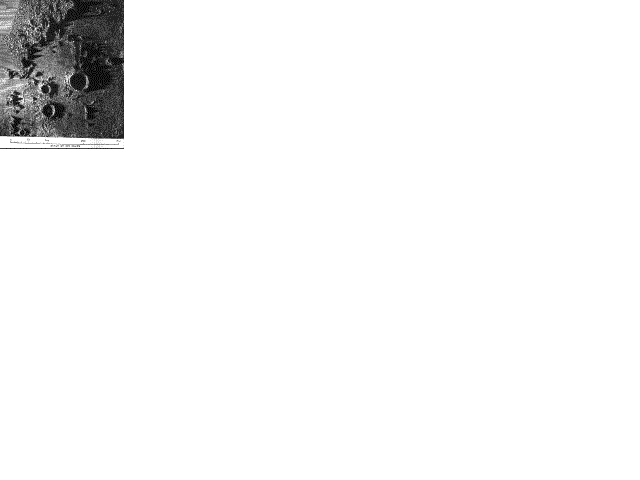surface by the Earth-shine, when the earth is in such a position with regard to the Moon, as to reflect some light on to it, as the Moon does to the earth.]
of the darkness of shadows in the Moon can result from the illuminative effect, as in our case in the earth, from light reflected into shadows by the blue sky of our earthly day The intensity of the contrast between light and shade must thus lend another awful aspect to the scenery of the Moon, while deprived of all those charming effects which artists term "aerial perspective," by which relative distances are rendered cognisable with such tender and exquisite beauty. The absence of atmosphere on the Moon causes the most distant objects to appear as close as the nearest; while the comparatively rapid curvature of the moon, owing to its being a globe only one-fourth the diameter of the earth, must necessarily limit very considerably the range of view.
 Lunar Mountains and Extinct Volcanic Craters
Lunar Mountains and Extinct Volcanic Craters
It is the combination of all these circumstances, which we know with absolute certainty must exist in the Moon, that gives to the contemplation of her marvellous surface, as revealed by the aid of powerful telescopes, -- one of the grandest and most deeply interesting subjects that can occupy our thoughts; especially when we regard the physical constitution and the peculiar structure of her surface, as that of our nearest planetary neighbour, and also as our serviceable attendant by night.
Then there are the Tides, so useful to man, preserving the sanitary condition of the river mouths and tide-swept shores. We must be grateful for the Moon's existence on that account alone. She is the grand scavenger and practical sanitary commissioner of the earth. Then consider the work she does! She moves hundreds of ships and barges, filled with valuable cargoes, up our tidal rivers, to the commercial cities on their banks. She thus performs a vast amount of daily and nightly mechanical drudgery. She is the most effective of all Tugs; and now that we understand the convertibility and conservation of force, we may be able to use her Tide-producing powers through the agency of electricity for mechanical purposes. It is even possible that the Tides may yet light our streets and houses![note: It is not quite a century since London was in part supplied with water by the Moon, through employing the tidal action by the waters at Old London Bridge, where the tide mills worked the water-supplying pumps.]
Is the moon inhabited? It seems to me that the entire absence of atmosphere and water forbids the supposition -- at least of any form of life with which we are acquainted. Add to this adverse condition, the fact of the moon's day being equal to fourteen of our days; the sun shining with much more brilliancy of effect in the moon than on the earth, where atmosphere and moisture act as an important agent in modifying its scorching rays; whilst no such agency exists in the moon. The sun shines there without intermission for fourteen days and nights. During that time the heat must accumulate to almost the melting point of lead; while, on the other hand, the absence of the sun for an equal period must be followed by a period of intense cold, such as we have no experience of, even in the Arctic regions. The highest authorities state that the cold during the Moon's long night must reach as low as 250 degrees below the freezing point of water. These considerations, I think, reasonably suggest that the existence of any form of life in the Moon is in the highest degree improbable.
The first occasion on which I exhibited my series of drawings of the Moon, together with a map six feet in diameter of its entire visible surface, was at the meeting of the British Association at Edinburgh in 1850. I always looked forward to these meetings with great pleasure, and attended them with supreme interest. My dear wife always accompanied me. It was our scientific holiday. It was also our holiday of friendship. We met many of our old friends, and made many new friends. Alas, how many of them have departed! Herschel, Faraday, Robinson, Taylor, Phillips, Brewster, Rosse, Fairbairn, Lassell, and a host of minor stars, who, although perhaps wanting in the brightness or magnitude of those I have named, made good amends by the warmth of their cheerful rays. We saw the younger lights emerging above the horizon: the men who still continue to shed their glory over the meetings of the Association.
| Previous chapter/page | Back | Home | Email this | Search | Discuss | Bookmark | Next chapter/page |